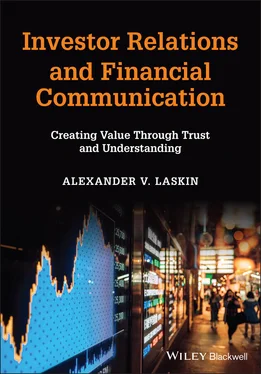Returning to the corporate sector of the economy, it is important to note that there are other financial communication jobs in corporations in addition to investor relations. In fact, there are many financial communication professionals in banking and insurance. Communicators working at banking institutions and credit unions communicate a large volume of financial information about credit cards, mortgages, savings accounts, and certificates of deposits. And, once again, often they have a responsibility to go beyond making the information available and instead focus on explaining and educating their audiences about all the nuances of their communications. Insurance is a subject with a very high complexity – life insurance alone can have many different categories with different payments, rules, premiums, and so on – term life insurance, whole life insurance, universal life insurance, variable life insurance, guaranteed issue life insurance, and more! All of this requires quality communications to help people understand the product and its purpose.
Investor Relations and Financial Communication Agencies
All the jobs described above – corporate investor relations jobs, communications jobs in banking and insurance, governmental financial communication jobs, or fundraising for not-for-profit organizations – represent in-house positions. These job functions are located within the organization they are trying to benefit. In addition to the in-house jobs, there are many financial communication jobs in the agency sector. There are many agencies that specialize in financial communication and investor relations and provide their expertise to a variety of organizations that need to supplement their in-house stuff.
One of the leading agencies with a strong reputation in investor relations is Prosek Partners. With offices in two leading financial centers of the world, New York City and London, Prosek has a sophisticated investor relations program that can support merger and acquisition transactions, help with shareholder activism, develop outreach to investors and financial analysts, plan events, and provide counsel to top management.
In addition to dedicated agencies in investor relations and financial communications, many big public relations and strategic communication agencies also offer specialized services in this area. Edelman, the largest public relation agency, has a strong financial communication practice. According to Edelman, its financial communication and capital markets practice employs more than 150 global advisors with backgrounds in finance, investor relations, communications, journalism, and government services.
A financial communication agency may be a great place for entry into the investor relations job. Agencies have no problems hiring recent college graduates with little or no experience. Working at an agency exposes you to many different clients in a variety of industries and builds experience very fast. Eventually, one of the agency clients may offer you an in-house job. It is a common way to transition from an agency job to a corporate job. Salaries in agencies are usually smaller than on the corporate side and, as a result, many agency employees eventually move to corporations, while agencies bring in more new entry-level employees with little or no prior experience.
The new hires at agencies usually have the titles of intern or account assistant . An agency client is called an account , thus an account assistant is the one who helps working on a client’s account. Once an agency employee gains sufficient experience, they may be given an account to manage on their own – then, they become account coordinator . Later, they may be promoted to larger accounts where multiple agency employees are involved – then, their title would reflect that as they grow through jobs of assistant account executive , account executive , senior account executive , and, finally, account director or account supervisor . As agency employees continue to advance up the career ladder, they gradually become more involved in managing the agency as a whole rather than managing separate accounts. The senior-level positions at agencies are vice president , senior vice president , executive vice president , partner , and, finally, senior partner . In large multinational agencies with regional offices, it is possible to be a regional director or a president/CEO of an agency subsidiary or a branch. Of course, at the very top, the agency would have the CEO of the whole organization and, sometimes, a chairperson .
This variety of titles and levels may seem confusing and unnecessary, but it is actually important for agencies to have such a structure because work at each level of this hierarchy is billed to the client at different levels. For example, a typical financial communication agency would charge about US$100 for an hour of work of an account assistant, while it would charge US$200 for an hour of an account executive – double the hourly billing rate. If an account requires involvement at the level of a vice president, the billable rate may be US$400 or US$500 an hour.
Billable hours are the lifeblood of an agency – it is important to track and monitor all the work in order to bill the clients fairly for all the work. Many agencies celebrate and reward employees who produce the most billable hours in a week or in a month. Most often agency employees work on multiple accounts at the same time. It is not uncommon in the agency world to work on four or five accounts at the same time. As a result, it becomes important to monitor closely how employees spend their day so that appropriate clients can be billed the correct amount of hours at an accurate rate.
Most people working in investor relations do not have an educational background in investor relations. It is not surprising considering there are pretty much no majors in investor relations. At best, one can find a standalone course in investor relations, financial communication, or business journalism. Only a small number of educational institutions have minors or specializations. For example, Newhouse School at Syracuse University launched a financial and investor communications emphasis that prepares students for jobs in investor relations, financial services, and corporate communications. As a result, just taking a class or two in investor relations or financial communication already puts a student ahead of many other job seekers. Some students interested in investor relations build their own program of study combining courses from accounting, finance, law, and strategic communications. Such students may major in communications to hone their writing and public speaking skills, while minoring in accounting to develop a good understanding of financial statements.
A study of IROs who are members of NIRI found that most IROs today have a business background. More than two-thirds of IROs in the survey reported having their bachelor’s degree from one of the business school majors – finance, accounting, or management. IROs with communication education were in a minority. Some IROs also reported having no business and no communication education – instead they grew into their investor relations job from an operational background and, as a result, they reported education in medicine, chemistry, aeronautics, engineering, and so on. Since the investor relations job requires an IRO to be an expert in what the company does, it is not much of a surprise that a specialist in the company’s business could become an IRO. Who better to explain the complexities and potential of a new chemical compound for future production of medicine than a chemist or a medic?
Читать дальше











